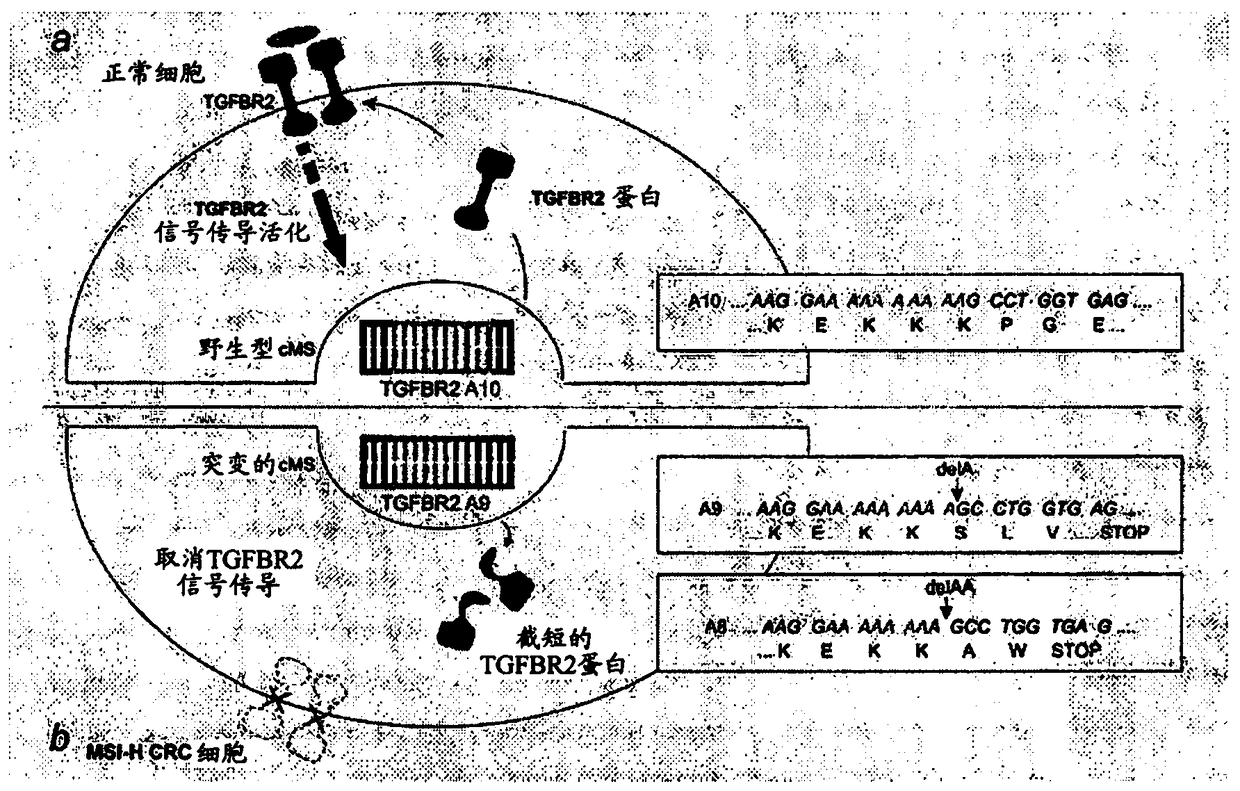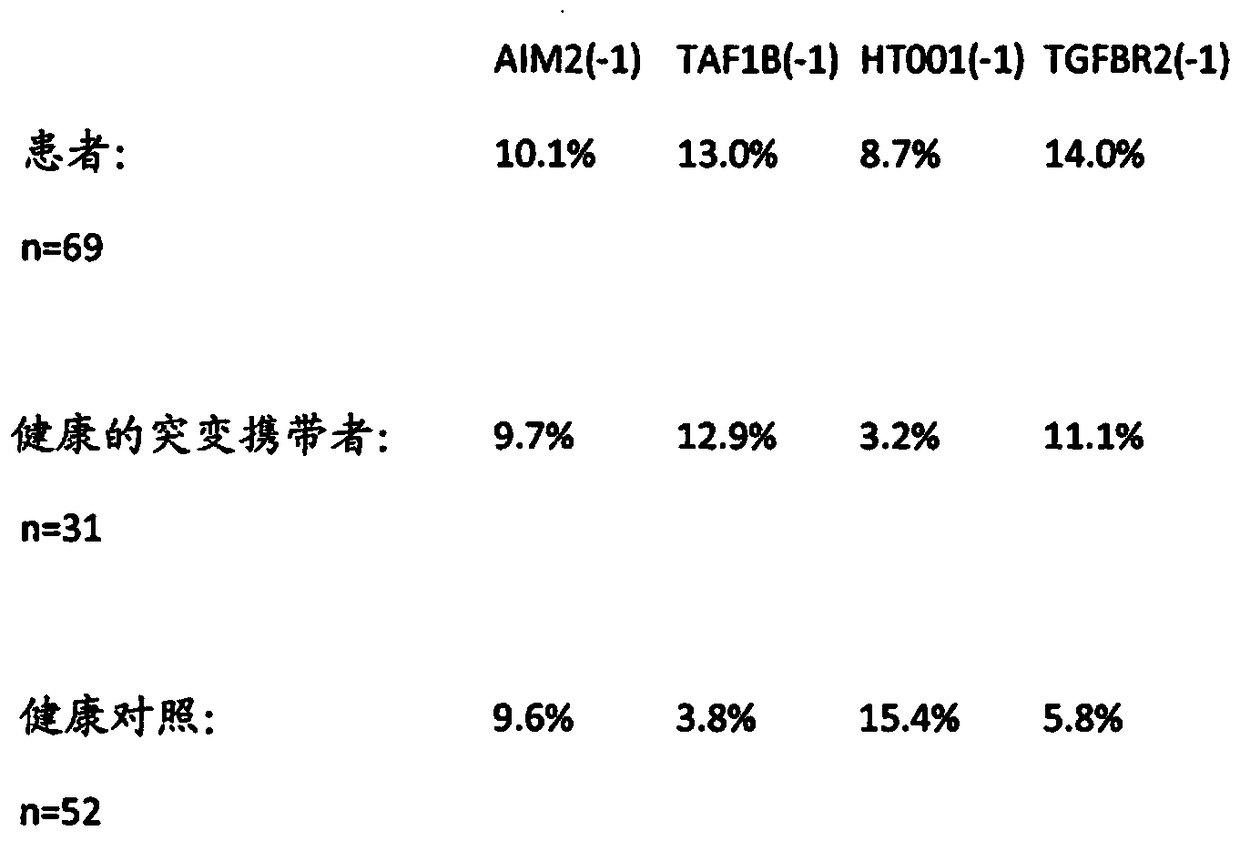Msi-specific frameshift peptides (fsps) for the prevention and treatment of cancer
A specific, frame-shifting technology, applied in the direction of cancer antigen components, antibody medical components, medical preparations containing active ingredients, etc., can solve the problem of insufficient immune response, weak immunogenicity, and inability to induce strong effector T-cells Activation and other issues
- Summary
- Abstract
- Description
- Claims
- Application Information
AI Technical Summary
Problems solved by technology
Method used
Image
Examples
Embodiment 1
[0059] Detection of FSP-specific T cells in peripheral blood from MSI colon cancer patients and healthy HNPCC mutation carriers
[0060] (A) method (ELISpot assay)
[0061] Quantification of FSP-specific peripheral blood Tc by measuring the number of secreted gamma-interferon (IFN-γ) Tc specific for newly designed FSP derived from 3 cMS-containing candidate genes using ELISpot assay Frequency of cells (pTc). ELISpot assays were performed using 96-well nitrocellulose plates (Multiscreen; Millipore, Bedford, MA) coated with mouse anti-human γ-interferon monoclonal antibody (mAb) ( Mabtech, Naka, Sweden) overnight and blocked with serum-containing medium. Sixfold pTc (0 days, lxl0 5 / well) and autologous CD-40-activated B cells as antigen-presenting cells (4xl0 4 / well, single addition of TiBc or pBC) was plated in 200 μl of IMDM medium containing 10% human AB serum. Peptides were added to a final concentration of 10 μg / ml. As a positive control, peripheral blood T cells ...
Embodiment 2
[0076] Detection of FSP-specific humoral immune responses in peripheral blood from healthy HNPCC mutation carriers and colon cancer patients with MSI
[0077] (A) Method (ELISA)
[0078] For enzyme-linked immunosorbent assay (ELISA), peptides at a concentration of 40 μg / ml in PBS were coated onto 96-well polystyrene microplates 'Maxisorp' (Nunc, Roskilde, Denmark) at 4 ℃ overnight. After coating, plates were rinsed 4 times with PBS (0.05% Tween) and blocked with 0.5% casein in PBS for 1 hour. Peptide binding to microplates and optimal saturating peptide concentrations were assessed using the alkaline phosphatase-peptide competition assay. To monitor the individual background response of each serum, use the INK4a A control peptide for the protein (p16_76-105), against which no antibody reactivity was found in a large cohort of individuals (Reuschenbach et al., 2008). Individual sera were diluted 1:100 with blocking buffer (0.5% casein in PBS) and assayed in duplicate for ...
Embodiment 3
[0082] Detection of FSP-specific cytotoxic T cell responses
[0083] The expression of CD107a on the surface of T effector cells when stimulated with clinical FSP antigen was determined. The CD107a assay was used to demonstrate the secretion of perforin / granzyme B-containing cytotoxic granules from effector cells. CD107a molecules are expressed on the surface of cytotoxic granules and are detectable on the cell surface if the granules are released in the context of a cytotoxic T cell response.
[0084] To determine the potential of FSP peptides to induce cytotoxic cellular immune responses, blood was drawn from healthy donors and T cells were stimulated with FSP using dendritic cells as antigen presenting cells. Stimulation was repeated weekly with a time span of four weeks. Four weeks later, T cells were harvested, co-cultured with target cells, and the FSP CD107a assay was used to analyze the peptide-specific induction of cytotoxic T cell responses.
[0085] In the presen...
PUM
 Login to View More
Login to View More Abstract
Description
Claims
Application Information
 Login to View More
Login to View More - R&D
- Intellectual Property
- Life Sciences
- Materials
- Tech Scout
- Unparalleled Data Quality
- Higher Quality Content
- 60% Fewer Hallucinations
Browse by: Latest US Patents, China's latest patents, Technical Efficacy Thesaurus, Application Domain, Technology Topic, Popular Technical Reports.
© 2025 PatSnap. All rights reserved.Legal|Privacy policy|Modern Slavery Act Transparency Statement|Sitemap|About US| Contact US: help@patsnap.com



